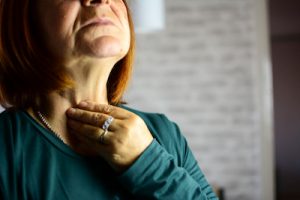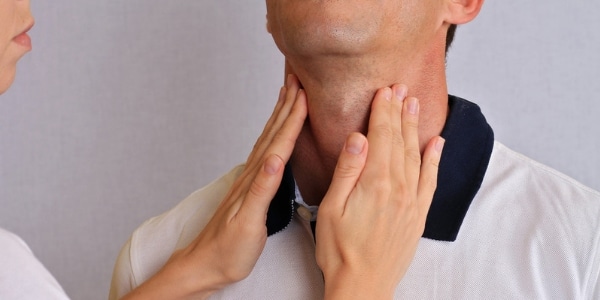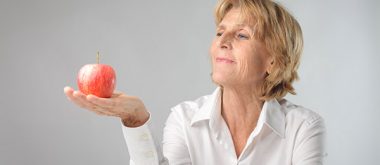The thyroid is responsible for producing hormones in both men and women. Without a steady amount of thyroid hormone, aging men and women are at risk for experiencing a variety of symptoms.
What Is the Thyroid?
The thyroid is a vital gland that helps regulate metabolism, mood, and many other functions of the body. A healthy thyroid can help both men and women maintain a healthy weight, body temperature and heart rate.
The thyroid resembles the shape of a butterfly and can be found in the front area of one’s throat. It’s approximately two inches long and, if swollen, can be felt on both sides of the neck. By using iodine from food, the thyroid can create two types of hormones: triiodothyronine and thyroxine.
Thyroid Hormone Production
Triiodothyronine (T3) and thyroxine (T4) are naturally occurring hormones that must be regulated in both men and women. If the body cannot produce enough hormones, a condition called hypothyroidism may occur. Although this condition can happen to anybody, it is more likely to occur in women over fifty.
Symptoms of hypothyroidism can include unexplained weight gain, extreme fatigue, an intolerance for cold temperatures, muscle weakness and swelling. In addition to physical symptoms, issues with depression and slowed thinking are frequently reported.
Problems related to reproductive systems are common. Women often experience heavier or lighter menstrual periods. Men can experience a loss in libido or erectile dysfunction from the hormonal irregularities of a malfunctioning thyroid.
What Does Age Have to Do With It?

Men in their fifties go through a similar hormonal change called andropause. Although a decline in testosterone is normal starting after the age of thirty, andropause has a wider range of hormonal symptoms. Hair loss, changes in skin, bone loss and memory decline are common physical signs of an aging thyroid. Depression and a loss of energy are also frequently reported.
Thyroid Function in the Elderly
Thyroid production commonly changes during the aging process. For elderly patients with subclinical thyroid results, special care should be taken. Although symptoms tend to be more subtle and can be confused with the natural aging process, thyroid testing should not be overlooked when caring for the elderly.
Two common thyroid-related issues in the elderly include hypothyroidism and hyperthyroidism. Hypothyroidism can impair memory and create “brain fog.” Attention and focus can deteriorate, mimicking signs of dementia or the natural aging process. Those struggling with untreated hypothyroidism may experience cognitive impairment and a poor quality of life. Hyperthyroidism is less common. The symptoms of hyperthyroidism include weight loss, anxiety and mood swings.
Conclusion
For patients over sixty, the potential for developing hormonal issues related to the thyroid drastically increases. To best diagnose and treat possible thyroid-related medical issues, seeing an endocrinologist is crucial.





